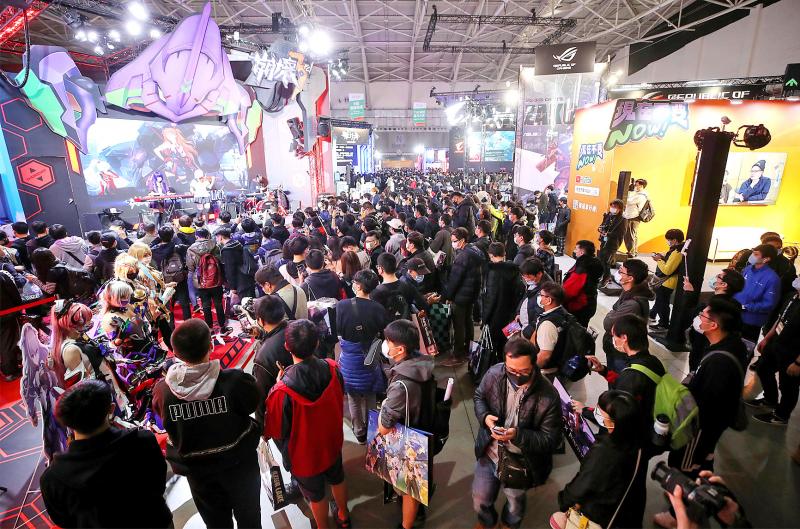The Taipei Game Show opened yesterday with a series of virtual and physical events, and the number of in-person attendees limited to 7,000 per day due to COVID-19 regulations.
There are also fewer exhibitors than in the past, with major industry players such as Sony Corp, Microsoft Corp, Bandai and Google Play skipping this year’s editions over pandemic concerns.
For the first time in the past few years, neither Sony nor Microsoft are presenting their new hardware or software at the event at the Taipei Nangang Exhibition Center, said the Taipei Computer Association (TCA), which organizes the event held through Sunday.

Photo: CNA
The association had originally aimed to present about 900 booths to visitors, but later scaled down the event to 500 booths, it said.
At the gaming fair’s opening ceremony, TCA chairman Paul Peng (彭双浪) said that visitors would be able to test the latest software of about 300 developers from more than 30 countries, either online or at the physical event.
The show features three themed areas: The “Indie House” area showcases 52 games produced by independent developers, the “Board Game Wonderland” features renowned games such as Minecraft, and the “Esports Tournament Stage” hosts gaming competitions.
As part of the fair, the Asia-Pacific Game Summit is held online, featuring the industry’s latest trends, and experts from Taiwan, China, France, Japan, Singapore, Thailand and the US.
The global games market generated US$159.3 billion in revenue last year, up 9.3 percent from 2019, Peng said, citing data released by Dutch firm Newzoo.
In many countries around the world, people spent more time gaming during COVID-19 lockdowns, causing the uptick, he said.
Visitors are required to sanitize their hands and present identification before entering the venue, as well as wear masks at all times and practice social distancing, Peng said.

KEEPING UP: The acquisition of a cleanroom in Taiwan would enable Micron to increase production in a market where demand continues to outpace supply, a Micron official said Micron Technology Inc has signed a letter of intent to buy a fabrication site in Taiwan from Powerchip Semiconductor Manufacturing Corp (力積電) for US$1.8 billion to expand its production of memory chips. Micron would take control of the P5 site in Miaoli County’s Tongluo Township (銅鑼) and plans to ramp up DRAM production in phases after the transaction closes in the second quarter, the company said in a statement on Saturday. The acquisition includes an existing 12 inch fab cleanroom of 27,871m2 and would further position Micron to address growing global demand for memory solutions, the company said. Micron expects the transaction to

Vincent Wei led fellow Singaporean farmers around an empty Malaysian plot, laying out plans for a greenhouse and rows of leafy vegetables. What he pitched was not just space for crops, but a lifeline for growers struggling to make ends meet in a city-state with high prices and little vacant land. The future agriculture hub is part of a joint special economic zone launched last year by the two neighbors, expected to cost US$123 million and produce 10,000 tonnes of fresh produce annually. It is attracting Singaporean farmers with promises of cheaper land, labor and energy just over the border.

US actor Matthew McConaughey has filed recordings of his image and voice with US patent authorities to protect them from unauthorized usage by artificial intelligence (AI) platforms, a representative said earlier this week. Several video clips and audio recordings were registered by the commercial arm of the Just Keep Livin’ Foundation, a non-profit created by the Oscar-winning actor and his wife, Camila, according to the US Patent and Trademark Office database. Many artists are increasingly concerned about the uncontrolled use of their image via generative AI since the rollout of ChatGPT and other AI-powered tools. Several US states have adopted

A proposed billionaires’ tax in California has ignited a political uproar in Silicon Valley, with tech titans threatening to leave the state while California Governor Gavin Newsom of the Democratic Party maneuvers to defeat a levy that he fears would lead to an exodus of wealth. A technology mecca, California has more billionaires than any other US state — a few hundred, by some estimates. About half its personal income tax revenue, a financial backbone in the nearly US$350 billion budget, comes from the top 1 percent of earners. A large healthcare union is attempting to place a proposal before